Israel and America’s Duet “Bomb, Bomb, Bomb Iran!”: Back in the Limelight
Even so the civil war in Syria is creating regional and global tensions, a much bigger potential crisis is brewing near by. This one is created by the increasing two tracks pressure put by Washington on Teheran. Once again, the familiar phrase “All options are on the table” has been used by the Obama administration. This crescendo in both economic and military pressures, added to the volatile situation in Syria, contains all the necessary ingredients to put world peace in jeopardy.
Economic Sanctions: Another Name for Regime Change Policy
Economically Iran is in very bad shape. Inflation is now skyrocketing with an official annual rate standing at 25 percent. The value of Iran’s currency, the rial, has dropped by 50 percent against the US dollar and the Euro in the past year. On Sunday, drastic new international sanctions were put in place against Iran to cut off even further Iran’s oil export which is the country main source of income. While a few Iranians are speculating on currency exchange, most have seen their life savings evaporate. The price of bread, for example, increased 16 times since 2010 when state subsidies were dropped. Financial Western sanctions have also hurt Iran tremendously by forbidding Iran to buy foreign currency reserves which the country had done in the past in order to prop up the rial.
In December 2011, the US Congress – under pressure from Israel’s lobby, namely AIPAC- passed a mandatory sanction package on Iran, almost unanimously ( 100 to 0 in the Senate and only 12 “no” votes in the House of Representatives). The draconian sanction package started June 27, and it makes mandatory for the US to sanction and fine heavily any third country banks or corporations doing business with Iran Central Bank. The intention is to completely crippled Iran’s oil sales. Of course, the ultimate goal of the United States and Israel is regime change through economic sanctions or more accurately, provoking an economic collapse using economic “weapons of mass destruction”.
But even so few in the United States and Western Europe have noticed, Iran is not as isolated as Washington would like it to be. Russia and China are of course the two heavy weight supporters of Iran. Both countries have opposed stronger UN sanctions. Russia, for strategic and geopolitical purpose, while in the case of China it has more to do with resources. China stands to be a prime beneficiary of the new sanctions, because it will get Iranian oil and gas for a cheaper price. Regionally, Iran also gets some support from Pakistan. Some US allies in Asia are very uneasy about the new sanctions imposed by Washington on Teheran. India, South Korea and Japan get around 62 percent of their oil supplies from Iran.
All ( Military ) Options are on the Table
To put even more pressure on Iran, and playing a very dangerous game, the United States has moved, in the past few days, more military assets in the Persian Gulf. The Obama administration has done it semi-quietly, but everybody, at least in the region, has taken notice of it. The large military deployment has to do with the control of the Strait of Hormuz which Iran had threatened to shut down a few months ago as a potential retaliation to an attack by either Israel or the US.
The military assets deployment is in part to please Israel, but this new US military build up carries many risks of escalation which include provoking Iran’s Revolutionary Guard to react. It could also be viewed by Israel as a good time frame to launch a preemptive strike against Iran. There is also some US electoral politics at play in the matter. President Obama’s opponent Mitt Romney has described the White House as “weak” in his dealing with Iran. So flexing some muscle on the part of the president might be a tactic to score points with Israel, the all powerful pro-Israeli lobby in DC, and middle of the road voters who still view Democrats as weak on defense.
With any diplomatic solutions fading away and more or less dying in the water of the Persian Gulf, the Obama administration is pursuing what the White House calls a “two track” policy against Iran. It is either regime change through economic sanctions or military action with the blessing and cooperation of Israel and Saudi Arabia.
Editor’s Note: All photographs by U.S. Navy Imagery.
Related Articles


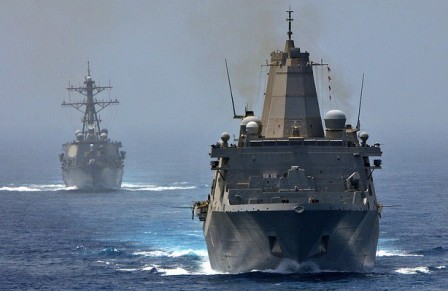
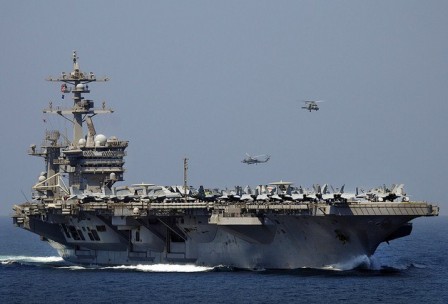
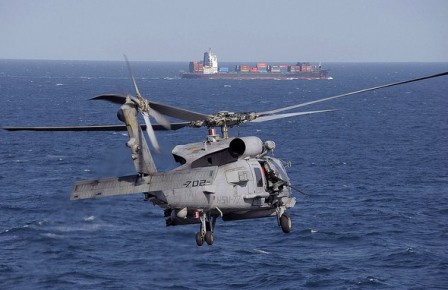
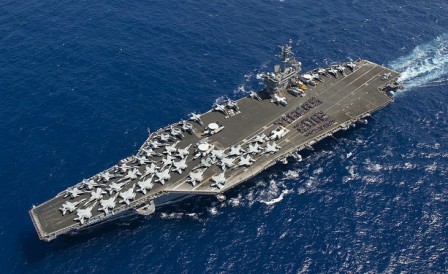
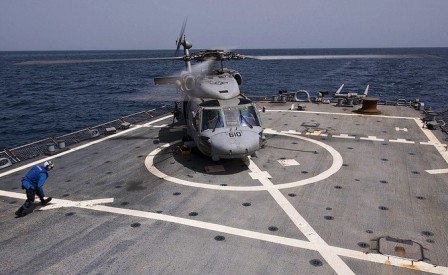
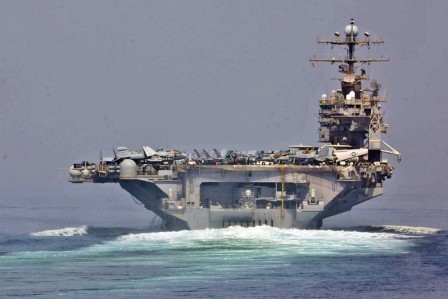











2 Responses to Israel and America’s Duet “Bomb, Bomb, Bomb Iran!”: Back in the Limelight
You must be logged in to post a comment Login